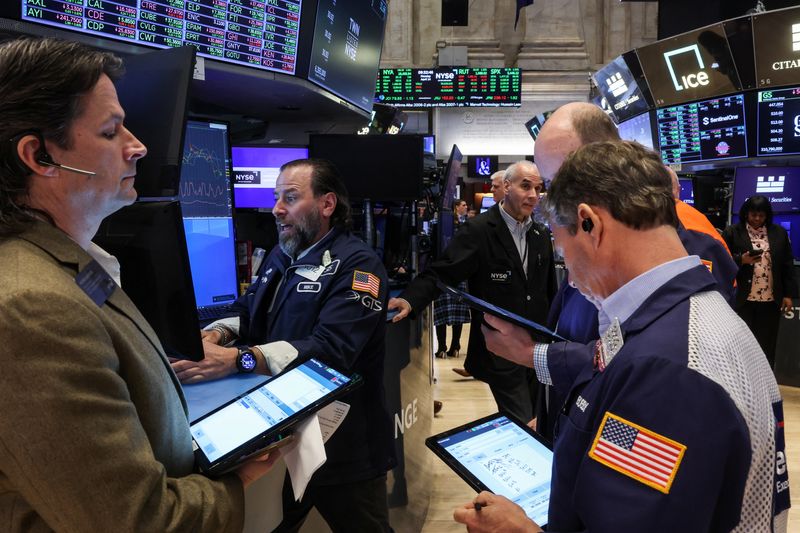Select Language

U.S. stock futures edge lower, suggesting a muted investor assessment of a new "framework" U.S.-China trade deal. U.S. Commerce Secretary Howard Lutnick says the agreement has resolved U.S. concerns over Chinese controls over the export of key rare earths metals, although the announcement was perceived to be scant on details. The focus is now turning to a monthly reading of U.S. consumer prices, a crucial gauge of inflation and a potential indicator of the impact of President Donald Trump’s punishing tariffs.
1. Futures inch lower
U.S. stock futures pointed lower as investors offered a lukewarm response to a fresh trade agreement between the United States and China.
An upcoming reading of U.S. inflation also looms large, with investors hoping that the figures provide more insight into the implications of Trump’s sweeping tariff drive.
By 03:30 ET (07:30 GMT), the Dow futures contract had slid by 81 points, or 0.2%, S&P 500 futures had fallen by 15 points, or 0.3%, and Nasdaq 100 futures had declined by 53 points, or 0.2%.
The main averages on Wall Street ended higher on Tuesday, spurred on by a jump in shares in electric car manufacturer Tesla (NASDAQ:TSLA). Google-parent Alphabet (NASDAQ:GOOGL) also climbed on media reports that ChatGPT-maker OpenAI is planning to use Google’s cloud service.
2. U.S. and China strike "framework" trade deal
The U.S. and China have reached a fresh deal to put their trade truce back on track following a round of crunch meetings in London.
Speaking at the end of two marathon days of discussions, U.S. Commerce Secretary Howard Lutnick said the agreement will put "meat on the bones" on a prior deal struck in Geneva last month -- which, despite easing some fears over an intensifying trade conflict between the world’s two largest economies, has shown signs of fragility.
While Tuesday’s announcement was short of particulars, Lutnick did claim that there was a resolution to a Chinese move to cut off access to a handful of metals crucial for American industry and the U.S. military. Lutnick added that Washington’s response to the measures would be unwound in a "balanced" manner, but did not provide further specifics.
China’s Vice Commerce Minister Li Chenggang also noted that a "framework" deal had been forged in principle, and would now be brought to Trump and Chinese counterpart Xi Jinping for final approval.
"The Sino-American trade negotiations in London have yielded plans to revive the flow of sensitive goods, but have failed to mark a breakthrough," analysts at ING said in a note to clients.
3. CPI ahead
Highlighting the economic calendar on Wednesday will be key gauge of U.S. inflation, which may provide the latest indication of the effect of Trump’s punishing tariffs on price growth and possibly factor into how the Federal Reserve approaches future interest rate decisions.
The Labor Department’s consumer price index is tipped to speed up slightly to 2.5% from 2.3%, while the month-on-month gauge is expected to match April’s pace of 0.2%. Stripping out more volatile items like food and fuel, the index is seen edging up to 2.9% year-over year and 0.3% on a monthly basis.
Despite Trump’s decision to delay elevated "reciprocal" levies on most countries, universal 10% duties, as well as heightened trade taxes on items like steel and aluminum, remain in effect. Meanwhile, analysts have noted that the effective U.S. tariff rate has risen sharply since Trump’s return to office in January.
Economists have flagged that the tariffs could drive up inflationary pressures and weigh on broader economic activity. With this uncertainty in mind, the Fed has recently opted to leave interest rates on hold, and markets are now not expecting the central bank to resume its cycle of borrowing cost reductions until September at the earliest.
4. Oracle (NYSE:ORCL) to report
Among the headliners on the earnings front will be cloud-computing group Oracle, which is slated to unveil its results after the close of U.S. markets.
In March, Oracle CEO Safra Catz outlined a solid growth trajectory for the business over its next two fiscal years, underpinned by surging demand for cutting-edge artificial intelligence products. Oracle has made AI a pillar of its future strategy, and is pushing to use the nascent technology to help its cloud services process large reams of information.
Cash flow will also be in the spotlight, especially as traders worry over Oracle’s heavy spending plans, analysts at Vital Knowledge said in a note. Wall Street is anticipating free cashflow of roughly $3 billion and capital expenditures of around $3.8 billion.
Elsewhere on the docket, online pet products retailer Chewy (NYSE:CHWY) and lingerie seller Victoria’s Secret are expected to report before the start of U.S. trading.
5. Oil steadies
Oil prices steadied Wednesday, with traders digesting the outcome of U.S.-China trade talks as well as the release of weekly U.S. crude inventories.
At 03:31 ET, Brent futures had increased by 0.2% to $67.00 a barrel and U.S. West Texas Intermediate crude futures rose 0.3% to $65.19 per barrel.
Both benchmarks posted their highest levels since April during the previous session.
The prospect of a U.S.-China trade deal has helped reduce demand concerns, with free-flowing trade expected to boost global economic activity and thus crude demand.
The weekly U.S. oil inventories report from the Energy Information Administration is due later in the session, and follows the American Petroleum Institute reporting that crude stocks fell by 370,000 barrels last week.

